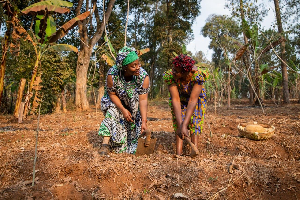Tema, July 8, GNA - Tema is expected to be the major consumer of the West African Gas Pipeline Project (WAGPP) in West Africa when its delivery starts in June 2005, Mr Kofi Asante Okai, External Affairs Manager of the Project announced on Tuesday at Tema.
This is because Tema is an industrial hub whose demand for power would be greater and it is expected to consume seven million cubic feet gas daily, which would rise gradually to 227 million cubic feet as against 130 million cubic feet consumed by the Takoradi thermal plant that is permanent.
Construction of the project would start in March 2004 and is expected that by June 2005 delivery would begin at Takoradi, Tema and Benin and the volume of gas would be two million cubic feet daily in the initial distribution and increase to 450 million cubic feet.
Mr Okai was presenting a paper on the "WAGP Overview and potential" at a meeting to brief stakeholders at Tema on the WAGP preliminary draft of the Environmental Impact Assessment (EIA) report.
The meeting provided a forum for traditional authorities from Kpone and Tema Manhean, Canoe fishermen, Ghana National Fire Service, Tema Development Corporation (TDC), Ghana Ports and Harbours Authority (GPHA), among others, to solicit their comments on the level of completeness, methodology and organisation of the preliminary draft of the EIA report.
Factories such as Ghana Cement Works (GHACEM), Tema Steel Works, Aluminium Works (Aluworks) and other steel companies, could use the WAGP to produce metallurgical, cement and fertilizers.
Mr Okai said if the WAGP were in operation, the Volta Aluminium Company (VALCO) would not have closed down its last potline as a result of the downward trend of the Akosombo Dam, which is the major source of power generation.
He stated that the consuming countries; Ghana, Benin and Togo would access natural gas from Nigeria as fuel for power generation and industrial development, saying Nigeria's gas reserve is estimated to be in excess of 160 trillion cubic feet, and will take 150 years to exhaust.
Mr Okai warned that when completed, the WAGP could not be used initially for domestic cooking because it could not be bottled for use like the Liquified Petroleum Gas (LPG), however, "in the next 10 to 20 years, when the retail network is in place, people who could afford to connect the pipe to their homes for domestic use".
The WAGP is lighter than the LPG, he said, and described it as cost effective, clean and reliable energy for West Africa and provides a foundation for regional growth and development that goes to prove the need for economic integration and work for all countries in the sub-region.
According to the External Affairs Manager, the WAGP would transport gas from Alagboado in Nigeria to the delivery points at Cotonou, Lome, Tema and Takoradi and development cost is approximately 450-500 million US dollars.
He said an intensive awareness educational programme would be carried out for fishermen along the coast on the activities of the WAGP to avert damaging their fishing equipment and therefore, asked fishermen to allay the fears that the project would disrupt their fishing expedition. Professor A. K. Armah, local EIA Consultant for the project, said precautionary measures would be put in place to rectify environmental pollution and degradation, while safety measures are also taken care off.
The Investment Consortium who owns the WAGP consists of Chevron Texaco West Africa Gas Pipeline with a share of 41.87 percent, Nigerian Petroleum Corporation, 25.25 percent, Shell Overseas Holdings Limited 16.50 percent and Takoradi Power Company Limited 16.38 percent. In the case of the company in Ghana, their share translates to 80 million dollars cash, which should be made available before the commencement of the project next year, and as at now only seven million dollars of the amount has been paid.
Business News of Wednesday, 9 July 2003
Source: GNA












